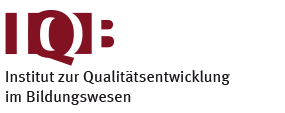Kompetenzdiagnostik durch Simulation und adaptives Testen für medizinische Fachberufe - Simulationstest (CoSMed VidSim)

Inhaltsverzeichnis
> Scientific Use Files beantragen
| Datensatz veröffentlicht am | 11.10.2016 |
|---|---|
| aktuelle Version verfügbar seit | 11.10.2016 |
| Erhebungszeitraum | 2014 |
| Stichprobe | Auszubildende zur*zum Medizinischen Fachangestellten im 3. Ausbildungsjahr (N=997) |
| Erhebungseinheit | Auszubildende |
| erfasste Kompetenzen | Kompetenzen in der Patientenbetreuung und -versorgung, Kaufmännisch-verwaltende Kompetenzen, Kompetenzen in Labordiagnostik und Hygienemanagement |
| Region | Bayern, Hessen, Niedersachsen, Sachsen, Schleswig-Holstein |
| Leitung | Seeber, Prof. Dr. Susan |
| Datengebende | Georg-August-Universität Göttingen Seeber, Prof. Dr. Susan |
| Auftraggebende / Mittelgebende | Bundesministerium für Bildung und Forschung (BMBF) |
| Link zur Studie | https://www.forschungsdaten-bildung.de/en/studies/425-cosmed-vidsim-video-simulationstest |
| Verwandte Studien | ASCOT-Verbund: MaK-adapt (DOI: 10.5159/IQB_CosMed_MaK-adapt_v1), DomPL-IK (DOI: 10.5159/IQB_DomPL-IK_v1), CoBALIT (DOI: 10.5159/IQB_CoBALIT_v1), TEMA (DOI: 10.5159/IQB_TEMA_v1), DigiDln-Kfz (DOI: http://doi.org/10.5159/IQB_DigiDIn_Kfz_SUF_Off-site_v1), EKGe (http://doi.org/10.5159/IQB_EKGe_v1), TeKoP (http://doi.org/10.5159/IQB_TeKoP_v1) |
| Zitationsvorschlag | Seeber, S., Schumann, M., Ketschau, T., Kleinhans, J. & Rüter, T. (2016). Competence Measurement based on Simulations and adaptive Testing in Medical Settings - Simulation Test (CoSMed VidSim) [Kompetenzdiagnostik durch Simulation und adaptives Testen für medizinische Fachberufe - Simulationstest (CoSMed VidSim)] (Version 1) [Datensatz]. Berlin: IQB – Institut zur Qualitätsentwicklung im Bildungswesen. http://doi.org/10.5159/IQB_CoSMed_VidSim_v1 |
| Datenrestriktion / Zugangshinweise | Die Bereitstellung der Daten erfolgt ohne Itemdokumentation. |
Projektbeschreibung
Das Verbundvorhaben CoSMed zielte auf die Modellierung und Messung beruflicher Kompetenzen Medizinischer Fachangestellter (MFA) und die Generierung komplexer Erklärungsmodelle zum Einfluss individueller und institutioneller Faktoren. Ein besonderer Stellenwert kam auch der Messung schulischer Kernkompetenzen als bedeutsamen Determinanten beruflicher Fachleistungen zu. Im Teilvorhaben "Modellierung, Messung und adaptive Testung beruflicher Fachkompetenzen bei Medizinischen Fachangestellten" wurden ein Domänenmodell und Kompetenzmodell ausdifferenziert sowie ein technologiebasiertes Assessment zur Messung berufsfachlichen Kompetenzen entwickelt. In einem ersten Schritt wurden die beruflichen Anforderungen an die Medizinischen Fachangestellten herausgearbeitet und typische Handlungsabläufe expliziert. Parallel erfolgte die Entwicklung einer webbasierten Unternehmenssimulation, in der möglichst authentische Arbeitsprozesse und Geschäftsprozesse von MFA abgebildet wurden. Für die Niveaumodellierung wurde jede Testaufgabe im Vorfeld multipel klassifiziert, um kognitions-psychologisch begründet Kompetenzstufen unterscheiden zu können. Die Auswertung der Daten der Haupterhebung erfolgte auf der Grundlage probabilistischer Testmodelle und weiterer Analyseverfahren, die die Herausarbeitung von Zusammenhängen zwischen beruflicher Fachkompetenz und individueller Merkmale sowie Kontextbedingungen erlauben. (Projekt/IQB)
Leerdatensätze
Um Ihnen einen ersten Überblick der Datensätze zu vermitteln, haben Sie hier die Möglichkeit, Leerdatensätze herunterzuladen.
Literatur
Eine Auswahl an Publikationen finden Sie in dieser  Literaturliste (Stand: 16.07.2021).
Literaturliste (Stand: 16.07.2021).
2016
Seeber, S. (2016). Vom Domänenmodell zum Kompetenzmodell: Konturen eines Assessmentdesigns zur Messung beruflicher Fachkompetenzen bei Medizinischen Fachangestellten. bwp, 1–25. Verfügbar unter http://www.bwpat.de/profil4/seeber_profil4.pdf
Seeber, S., Ketschau, T. & Rüter, T. (2016). Struktur und Niveau beruflicher Fachkompetenz bei Medizinischen Fachangestellten. Unterrichtswissenschaft, 44(2), 185–203.
Seeber, S., Schumann, M., Ketschau, T., Rüter, T. & Kleinhans, J. (2016). Modellierung und Messung von Fachkompetenzen Medizinischer Fachangestellter (CoSMed). In K. Beck, M. Landenberger & F. Oser (Hrsg.), Technologiebasierte Kompetenzmessung in der beruflichen Bildung. Ergebnisse aus der BMBF-Förderinitiative ASCOT (Wirtschaft - Beruf - Ethik#Bd.#32, S. 205–223). Bielefeld: Bertelsmann.
Seeber, S., Schumann, M., Ketschau, T., Kleinhans, J. & Rüter, T. (2016). Kompetenzdiagnostik durch Simulation und adaptives Testen für medizinische Fachberufe (CosMed VidSim) (Version 1) [Datensatz]. Berlin: IQB – Institut zur Qualitätsentwicklung im Bildungswesen. https://doi.org/10.5159/IQB_CoSMed_VidSim_v1
2015
Kleinhans, J. & Schumann, M. (2015). Increase in Testing Efficiency through the Development of an IT-Based Adaptive Testing Tool for Competency Measurement Applied to a Health Worker Training Test Case. In M. B. Nunes & M. McPherson (Hrsg.), Proceedings of the International Association for Development of the Information Society (IADIS) International Conference on e-Learning (Las Palmas de Gran Canaria, Spain, July 21-24, 2015). International Association for the Development of the Information Society.
2014
Dietzen, A., Srbeny, C. & Tschöpe, T. (2014). Messung sozialer Kompetenzen am Beispiel Medizinischer Fachangestellter. Berufsbildung, 68(146), 10–12. Verfügbar unter http://www.ciando.com/ebook/bid-1510100/intrefid/491694
Srbeny, C. (2014). Soziale Kompetenzen erkennen - Kompetenzdiagnostik als Thema beim Bildungspolitischen Forum. praxisnah, 20, 10–12.
2012
Dietzen, A., Monnier, M. & Tschöpe, T. (2012). Qualifizierung in Gesundheits- und Pflegeberufen. Berufsbildung in Wissenschaft und Praxis, 41(6), 6–41.
Dietzen, A., Monnier, M. & Tschöpe, T. (2012). Soziale Kompetenzen von medizinischen Fachangestellten messen. Entwicklung eines Verfahrens im Projekt CoSMed. Berufsbildung in Wissenschaft und Praxis, 41(6), 24–28. Verfügbar unter http://www.bibb.de/veroeffentlichungen/de/publication/show/id/6972

